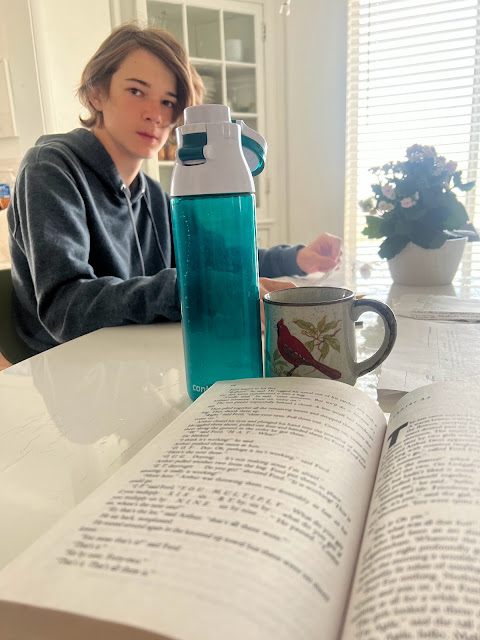Men's Week: Supporting Your Wife in the Grieving Process by Darin Eckton

Cjane asked me to share about my experience with helping my wife Jenny (who goes by ~j. in the blog world) through the grieving process of losing our child. To understand and contextualize my comments, it may be helpful to begin with a short list of six prefacing statements:
- Generally, men and women grieve differently – polar opposite differently.
- I am not a spokesman for all husbands who have helped or will ever help their wives grieve the loss of their own child. (Each situation is unique)
- Each of us is given challenging opportunities in life to grow as well as the resources and strength to deal with them. (It’s difficult to know the sweet without the bitter)
- There is a God who is our Heavenly Father and he loves and blesses us as His children – He often blesses us through each one of us.
- Though we may lose loved ones to death, through Jesus Christ, all will live again.
- We can be eternal families and be with our loved ones again after this life.
Now that I’ve established these six prefacing statements, I’d like to share our experience and discuss it in the context of the statements above.
THE ABBREVIATED EXPERIENCE
My ~j. was pregnant with our second child, a boy due to be born in December 2000. As a commentary, the fact that I mention the gender is not significant in the stereotypical manly way that I was waiting for ‘my boy’. Our first child was a girl who we adored and continue to adore this day. To make a long story short, it was the last day of September (a Saturday) that ~j., 7 months pregnant, did not feel the baby move. Men, for those of you have gone through this, you likely have experienced it and for those who are first-timers, this is a common experience where the pregnant woman goes through periods of time when she often feels anxiety for the unborn child who has not moved for a few hours straight (or longer). During our first pregnancy, she had already experienced these stretches (no reference to the beloved marks that are often left behind after birth) of time without movement. Well, she had gone much of that day without feeling any movement. Very early Sunday morning she woke up in a panic because she still had not felt the baby move (as many women can appreciate, early in the morning was often the time, according to her experiences, that babies break out the music and breakdance in the womb). Something was different this time. She told me that we needed to go to the Emergency Room. Fortunately, ~j.’s brother was living a few blocks away and he was able to come over and be there at our apartment with our then 18 month-old daughter. We arrived at the ER and a nurse brought us into a room and checked for a heartbeat, which she did not find. She tried again and did not find one. The nurse then wheeled in an ultrasound machine and ~j. removed her glasses because she didn’t want to see clearly what was beginning to be inevitable. As I recall, I stood close to her head, holding her hand (praying all the while for her and for guidance as to how I could help her) and the ultrasound confirmed the sad truth. The nurse informed us that the doctor was on his way and that he would have to confirm it. We asked the nurse if she would leave us alone and I proceeded to give ~j. a blessing by the power of the priesthood (for additional insight on priesthood blessings click here. The blessing turned out to be one of the most comforting experiences in which it was revealed to us our son’s brief mission in mortality and additional insight that I won’t share because of its personal and sacred nature. However, this blessing turned out to be the beginning of a long, ongoing source of strength.
The doctor came in, confirmed what we sadly knew, and then began to discuss options. We scheduled a day to ‘have our baby’, which happened to be on Tuesday, October 3, 2000. Instead of having the baby emerge with those beautiful screams, ~j. would have to give birth to a dead child. With our first child, we scheduled a time for ~j. to be induced. Women (and men), how much would you look forward to scheduling a time to give birth to a dead child? Over the next couple days, the rest of Sunday and Monday, were two of the most difficult days spent in much prayer, reflection, sadness, and ~j. even went through the common process of ‘what ifs’, feeling guilty that it was her fault. I remember mostly trying to listen and allow her to voice her sadness without doing much talking (men, I recommend this approach) until I felt inspired to say or do something. I remember my prayers and thoughts were focused on her and having the inspiration to know what to say and do that would be supportive and loving. We were given a few options described to us by the doctor in terms of how we were to deal with the body of our son. Option 1 after birth, they could immediately take the body and have it cremated. Option 2, we could choose to donate the body for scientific research. Option 3, we could have a burial. We’ve known individuals who have chosen other options, but for us, the clear decision was to bury our baby boy, even though we were still students, living in an apartment and didn’t really have the money for it. We felt it was what we needed for our family and the grieving process. For us (and I do mean, for us, not casting a judgment on those who may have chosen an alternative route), this decision to bury our son in ‘Baby Land’ at the Provo Cemetery has helped with our grieving process. We were fortunate to spend time holding our son for a few hours after he was born. These too, were sacred moments that helped with the grieving process. Later, ~j. and I went through the process of choosing a small casket, a gravestone, and instead of a hearse, we took our own son’s casket to the cemetery in the back seat of our car. Our brothers were pallbearers and we had a little funeral service for a small group of very supportive friends and family at the cemetery. Again, for us, these were all crucial parts of the grieving process.
A FEW SPECIFIC EXAMPLES OF GRIEVING
Think of grieving the death of a child – one incredibly difficult experience to say the least. Think of all the changes a woman’s body goes through during pregnancy – another very difficult experience (if it’s possible to even describe it this way). Now, combine the two!! Imagine (which is all I and any husband can truly do) going through 7 months of pregnancy, gaining the weight, going through hormonal changes, and giving birth, to not have anything to show for it. The chemical changes alone in the body often present challenges. Imagine, now your wife gives birth and her milk starts coming in, which (I’m told) is often painful, yet there is no baby to express the milk. She went through painful engorgement and had to sobbingly pump the milk to then throw it out. I remember days when ~j. was so depressed. I didn’t know what to do. It was as if she was in a daze. She didn’t have the strength to do anything. I remember when it was time for me to return to work (at the time I worked full time at BYU and we lived south of campus) it was difficult for her to understand how I could just go back to work. She viewed this as a quasi-betrayal on my part and thought I should still be grieving. Instead of her picking me from work in the evenings, I would often literally run home to be with her. This went on for at least a couple months.
ONE SIZE DOES NOT FIT ALL
We cannot pretend that the loss of our stillborn son empowers us to know exactly how other husbands and wives feel who are trying to grieve and process the loss of their child, whether it was a similar stillbirth situation, a toddler, a teen, etc. When a couple loses a child, please accept the reality that even if you are a family member, best friend, child, or whoever you may be and however good your intentions, you do not know how the couple feels. Even if you have lost a child yourself, while you may be able to empathize to a certain degree, please consider what you say and do as you strive to help. For example, statements like “I know exactly how you feel”, “I lost a child and know what it’s like”, “I had a miscarriage and know what you must be going through” or “At least you have another child to fall back on” may not be as helpful as you might think. Hugs, email, an old-fashioned letter, a meal (whether it’s assigned or given randomly) and many other acts of kindness, besides words, are generally well received when given from the heart. Sometimes it might be best to say little or nothing at all and just go do.
EXTENDING YOUR LOVE
We often hear that actions speak louder than words. In trying to help others during the grieving process, this may be especially true. People naturally want to help, but sometimes make things awkward by what they say. While we experienced some of these awkward moments, we could tell people were trying and had good intentions. We were blessed by so many who sent cards, email, gave hugs, brought food, watched our daughter, etc., etc. I say ‘etc.’ to shorten what I write here and not to diminish in any way the goodness of others, especially because it helped us to focus on grieving and our immediate needs. We will forever be grateful to the anonymous donor(s) who left $500 cash taped to our apartment door in an envelope. We are grateful to Brandy and Christi for buying the burial clothes. God indeed blesses us through the kindness of others. We often never know who is going through a grieving process or who may just need a lift, which is why it’s important to always treat others with love and respect.
THE GRIEVING PROCESS – THE GIFT THAT KEEPS ON GIVING
Even though this happened in October 2000, it is important to recognize that the grieving continues today and at varying levels of intensity. Usually every year around late September/early October, ~j. has moments of sadness. She misses our son. We have made it a tradition with our family to talk openly of our son because he is a member of our family. We talk about and pray for him. We visit his grave on Easter, Memorial Day, his birthday, and other spontaneous moments. Just last week, on ~j.’s birthday, even though we had just visited our son’s grave as a family three days prior on Easter Sunday, ~j. went to our son’s grave by herself to spend some time and sobbed for at least 15 minutes straight. All of these moments continue to be precious gifts that help with the grieving process and help us remember that we are blessed. We have also been a support to others who have gone through a similar situation. We freely admit that our situation is not the same, but we stand ready to make meals, listen or talk about our experiences. Like the rest of you, we just want to be helpful and sensitive to the needs of others.
THE GREATEST GIFTS
We stand as witnesses that the greatest gifts we enjoy come from God. He is our Heavenly Father and we are His children. He sent His son, Jesus Christ, to help all mankind overcome death, sin, sickness, and so many other ills we face in mortality. Through Christ’s glorious resurrection we will all overcome death and be resurrected with perfect bodies. We know that our son and all others who have passed on will receive perfect bodies. This helps with the grieving process. We also witness that through ongoing repentance and sacred temple covenants made and kept that we have the promise to be with and raise our son as an eternal family. This truly is the greatest of gifts and we look forward to it. In the meantime, while this experience has been one of the most bitter and difficult to handle, it has also provided us with some of the sweetest moments in which God, through His tender mercies, has allowed us to see, feel and understand certain things that we likely would not have, had we not gone through the experience. Our hearts go out to those who have lost and will yet lose loved ones. Grieving is real and we need to be sensitive to others, whether they’re a spouse or not. Charity never faileth and it is through charity – that of God who loved the world that He gave His only Begotten Son, that of Christ who suffered, died and lives for us, and that of each one of us who reaches out to bless, regardless of the circumstances – we will experience wonderful gifts and receive so many more. May we all recognize and enjoy the gifts in our lives!

LDS Bountiful Temple (Bountiful, Utah)
Darin is the husband of Jenny Eckton http://www.formerlyphread.com and who will be speaking as part of a panel at the Casual Blogger Conference on Saturday, May 29). He is finishing his doctorate in Educational Leadership at BYU, is the Chair of Undergraduate Studies with Argosy University, and is the President and Founder of a Utah County-based educational non-profit organization (http://ourteamsinc.org).
xoxox
c jane







